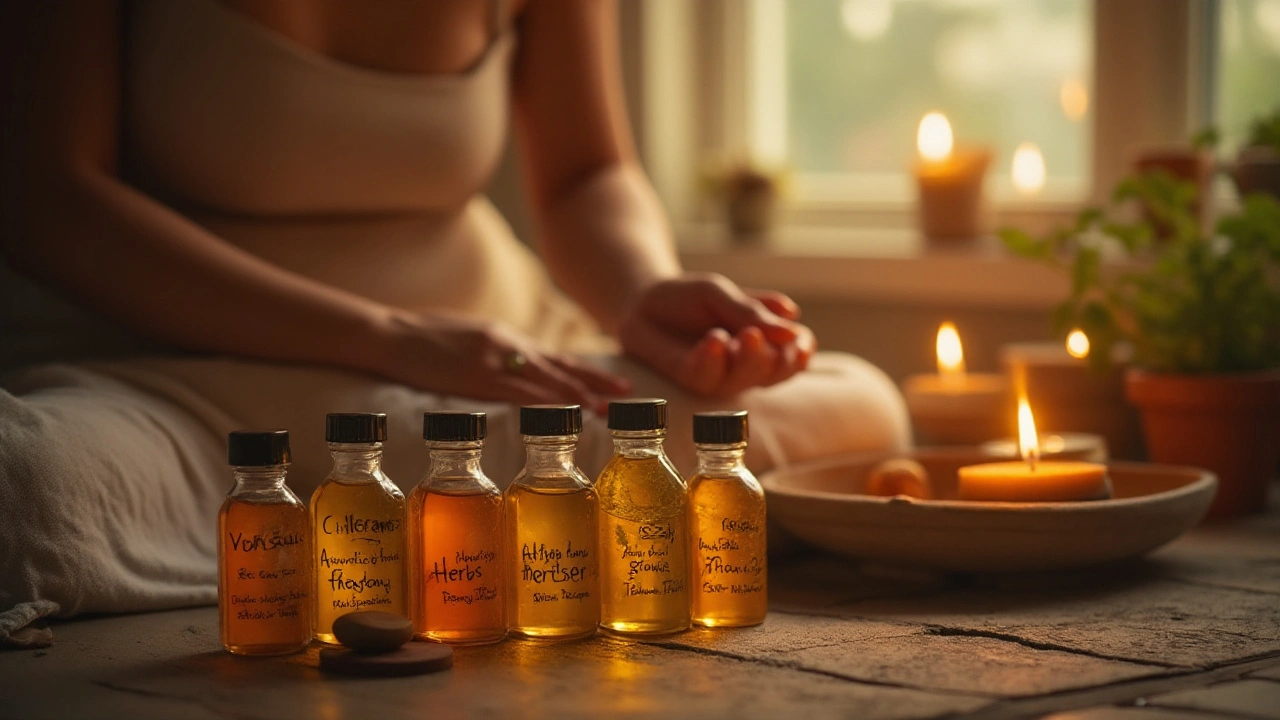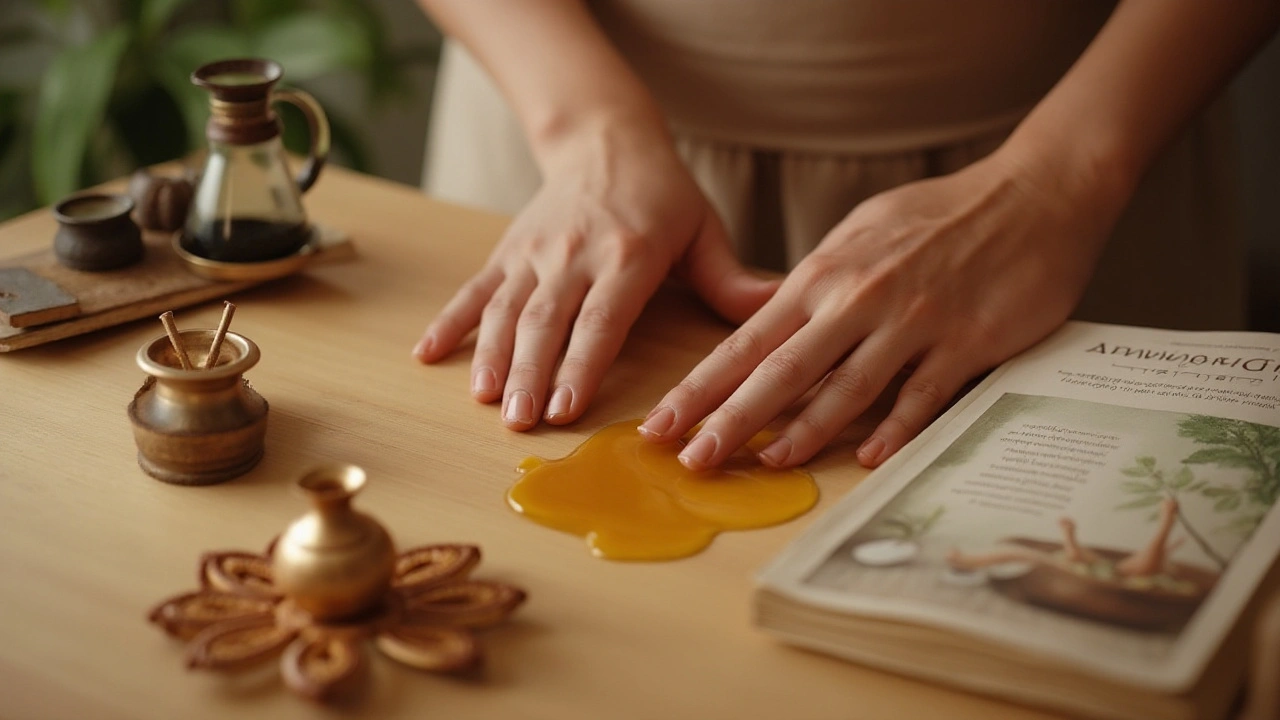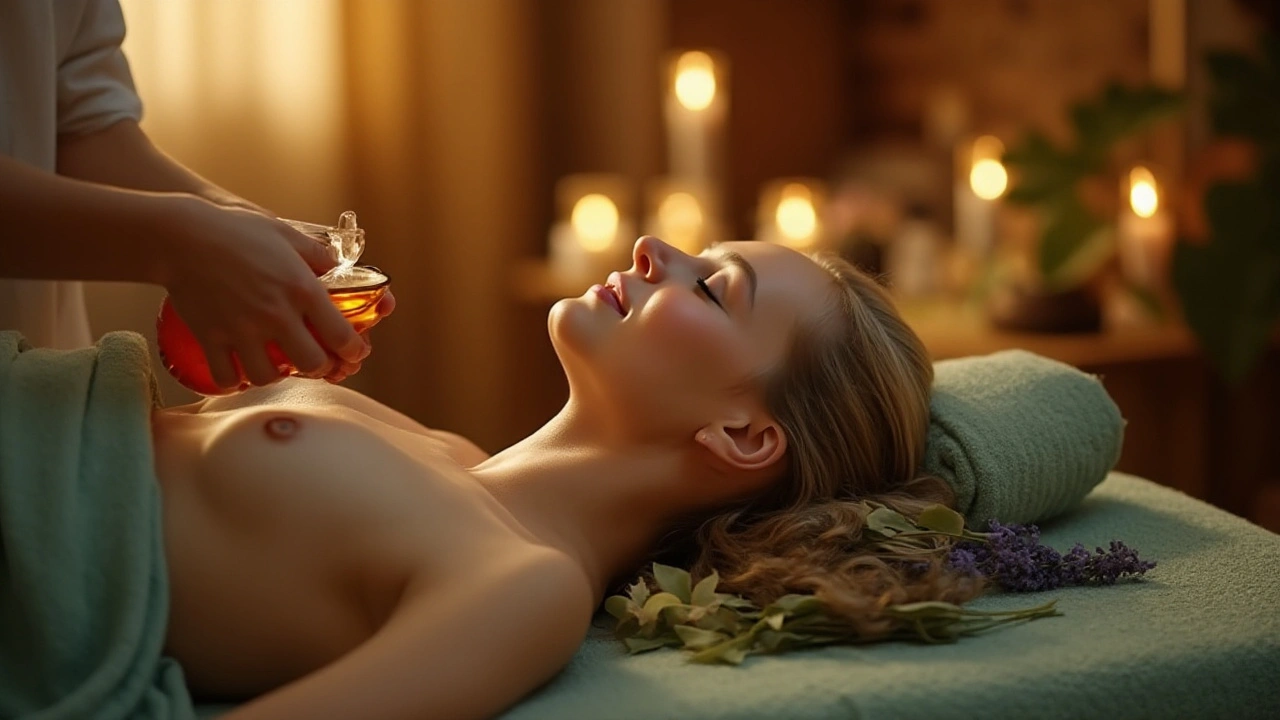In our fast-paced world, finding moments of tranquility can seem elusive. Yet, ancient traditions hold secrets to wellness that modern life often overlooks. Abhyanga, a delightful self-massage rooted in Ayurveda, serves as a bridge to reconnect with tranquility and vitality.
This age-old technique not only nourishes the skin but also rejuvenates the body and mind, leaving one relaxed and refreshed. As you delve into the art of Abhyanga, you'll explore its healing touch, learn how to choose the perfect oils, and discover how this practice can be a soothing ritual of self-love.
- Understanding Abhyanga and Its Origins
- Health Benefits of Abhyanga
- Selecting the Right Oils for Your Dosha
- Step-by-Step Guide to Performing Abhyanga at Home
- Incorporating Abhyanga into Daily Life
Understanding Abhyanga and Its Origins
Abhyanga, an integral part of Ayurvedic wellness, is not merely a massage but a ritual that dates back thousands of years. Originating from ancient India, Ayurveda is one of the world's oldest holistic healing systems, emphasizing balance among body, mind, and spirit. Abhyanga, which translates to "oil massage," was developed as a means to nurture and maintain this equilibrium. Practiced traditionally by Ayurvedic practitioners, Abhyanga involves using warm, herbal oils to anoint the body, which is believed to harmonize the doshas, or the body's energy forces known as Vata, Pitta, and Kapha. This practice was not simply an indulgence but deemed essential for maintaining health and preventing disease.
According to Ayurvedic texts like the Charaka Samhita, regular oil massage can delay aging, relieve fatigue, and improve sleep, thereby enhancing quality of life. The selection of oils plays a significant role in Abhyanga, with each oil potentially impacting the doshas differently, thus requiring a mindful choice tailored to the individual's constitution. This personalized approach underscores the science behind Abhyanga, showcasing its adaptability and depth. Noteworthy is a quote by Vasant Lad, a renowned Ayurvedic physician, "If you love yourself, you will do Abhyanga." This reflects the profound love and respect for one's own body and soul, as subscribed in Ayurvedic lore.
The Vedic sages also believed that Abhyanga was a way to open up energy channels known as Nadis, facilitating better circulation and nourishment of the tissues. By enhancing circulation, the massage aids in detoxification, clearing the body of impurities while infusing it with warmth and vitality. Historical records highlight how this form of massage was not just confined to the elites but embraced by every household as part of daily routine, indicative of its widespread acceptance and the ease of its integration into daily life. Despite modernization, Abhyanga continues to hold relevance for its therapeutic benefits, offering a counterbalance to stress and lifestyle-related disorders prevalent today.
Modern research substantiates many of Abhyanga's claimed benefits, aligning them with scientific understandings of stress reduction and skin health. Studies have shown that the practice of regular oil massage can significantly decrease levels of the stress hormone cortisol, thus underscoring its calming effect on the body. Moreover, the oils used in Abhyanga massage, such as sesame and coconut oils, are rich in antioxidants, which play a critical role in skin protection and rejuvenation. This ancient practice bridges the gap between age-old wisdom and contemporary self-care, affirming its timeless efficacy and appeal. To truly understand Abhyanga, one must appreciate its philosophical foundation that encourages nurturing one's self with care and reverence, a practice as relevant today as it was in antiquity.
Health Benefits of Abhyanga
Immersing oneself in the ancient practice of Abhyanga leads to a myriad of health benefits both tangible and intangible. Submerging the body in warm oils, tailored to individual doshas, provides a gentle and nurturing touch. This touch works wonders, from the outer layer of the skin to the depths of the mind. Beginning with the skin, regular Abhyanga sessions are known to deeply hydrate and nourish the skin, leaving it with an enviable glow often unmatched by modern skincare regimens. The massage facilitates the removal of toxins from the skin, and some adherents report significant improvements in skin tone and texture with consistent practice.
Beyond the surface, this unique massage method shows its proficiency by enhancing blood circulation throughout the body, which can assist with metabolism and nutrient delivery. Improved circulation means increased energy levels and a heightened sense of awareness and focus, which becomes a boon for daily activities. Those who have integrated Abhyanga into their lifestyles often speak to the incredible way it calms the nervous system, a significant benefit in today’s hectic environment. The rhythmic strokes of this massage uniquely stimulate the parasympathetic nervous system, promoting profound relaxation and assisting in stress reduction. Jeffrey Smith, an esteemed Ayurvedic practitioner, once noted,
"Abhyanga not only nourishes the body, it comforts the soul, acting as a balm for the weary spirit."
This massage also aids in lymphatic drainage, which plays a crucial role in maintaining a healthy immune system. The gentle, sweeping motions effectively encourage the movement of lymph fluids, supporting detoxification processes. With regular practice, individuals have observed a significant reduction in fluid retention and improved immunity, making it an invaluable routine for those prone to frequent illnesses. Sleep, often elusive in our modern world, benefits too, as Abhyanga engages relaxation centers in the brain, thus improving sleep patterns and quality. It is no wonder that practitioners frequently report deeper and more restorative sleep periods after indulging in this ancient technique.
Psychologically, Abhyanga’s benefits are equally pronounced. The dedicated time for self-care that Abhyanga demands becomes a meditative session that offers time to gather thoughts, reflect deeply, and nurture self-awareness. Regular practice has been linked to decreased anxiety and depressive symptoms, owing to the holistic nature of its soothing and nurturing qualities. Dopamine and serotonin levels can see a positive shift, leaving practitioners with an elevated mood and improved outlook on life. It transcends being merely a physical experience; it becomes a journey into personal well-being and self-discovery. Not to forget, for those leading athletic lifestyles, Abhyanga serves as an invaluable ally by increasing flexibility and supporting muscle recovery.
Finally, it is worth mentioning the traditional belief that Abhyanga aids in balancing the body’s doshas—Vata, Pitta, and Kapha—leading to overall harmony and equilibrium within the bodily systems. A personalized approach to the oils used can correct imbalances that modern life tends to exacerbate. Whether seeking to soothe a restless mind, revitalize tired muscles, or simply bestow oneself with care, the profound health benefits of Abhyanga stand as a testament to its enduring relevance and treasured status in holistic wellness paradigms.

Selecting the Right Oils for Your Dosha
Delving into the world of Abhyanga, selecting the perfect oil for your unique dosha is an essential aspect of enhancing your massage experience. In Ayurvedic practices, doshas are the bio-energies that govern our physical and mental processes, known as Vata, Pitta, and Kapha. Each person typically has a primary dosha or a combination of two, which influences their tendencies and health. Knowing your dosha helps in aligning the practice of Abhyanga massage with your body's needs, optimizing its benefits. The process of selecting the right oil makes all the difference, ensuring that the massage supports balance and tranquility, rather than aggravating existing imbalances.
For those with a predominant Vata dosha, characterized by qualities like dryness, lightness, and coldness, choosing warming, grounding oils is vital. Generally, heavier oils like sesame or almond oil are recommended, as they penetrate deeply into the skin and help in counteracting Vata's natural dryness. The warming nature of these oils creates a soothing cocoon, nurturing the nervous system and promoting calmness. As a point of interest, Vata types might find that adding a few drops of essential oils such as lavender or bergamot further enhances the soothing effects, providing a sweet aroma that calms the senses.
In contrast, Pitta dosha, dominated by heat, intensity, and oiliness, requires cooling, calming oils to maintain balance. Coconut oil emerges as a popular choice for Pitta individuals due to its natural cooling properties. This oil helps in soothing inflamed or irritated skin, while simultaneously grounding the fiery nature associated with Pitta. Aloe vera oil can also serve as a wonderful alternative, renowned for its cooling and moisturizing capabilities. Engaging in Ayurvedic wellness practices such as incorporating jasmine or sandalwood essential oils is highly recommended for Pitta, as these fragrances are traditionally considered cooling.
Dr. Vasant Lad, a pioneer in Ayurveda, notes, "Your body knows what it needs; choosing oils that complement your dosha amplifies the effects of Abhyanga, transforming it into a deeply therapeutic ritual."
Finally, individuals with a dominant Kapha dosha, which embodies qualities like heaviness, steadiness, and coldness, benefit from invigorating, warming oils. Light but warming oils such as mustard seed or olive oil are excellent for Kapha as they stimulate, detoxify, and invigorate the body. These oils work by breaking up stagnation and promoting circulation, crucial for keeping Kapha types lively and full of zest. Kapha individuals can amplify these effects by adding invigorating essential oils like eucalyptus or rosemary, which are known for their uplifting and energizing properties.
While understanding the nuances of your dosha is critical in selecting the right oil, it's equally important to be attentive to how your body responds to each oil. Experimentation may be necessary, as the body’s needs can change with seasons or life stage transitions. Regular practice and adjustments ensure that the oil massage benefits extend to various facets of health, including stress reduction, improved skin health, and an enhanced sense of well-being. This practice of Abhyanga is more than just applying oil; it's about nurturing the body and soul through mindful attention and care.
Step-by-Step Guide to Performing Abhyanga at Home
Diving into the world of Abhyanga oil massage at home is both exciting and deeply rewarding. You don't need to be a seasoned practitioner to enjoy its myriad benefits. All you need is a dedicated space, some quality oils, and an inclination for self-care. Begin by setting a serene environment; less clutter encourages a more meaningful experience. Dim the lights, play some soothing music, and create a peaceful corner where you can fully immerse yourself in this ancient ayurvedic art.
Next, select the right oils. As Ayurvedic wellness emphasizes harmony with your body type or 'dosha', choosing the oil that complements your dosha boosts the efficacy of the massage. Vata types benefit from warm sesame oil, while Pitta types feel comforted by cooling coconut oil. For Kapha types, invigorating mustard or olive oil works best. Once you've chosen your oil, warm it slightly to body temperature as warm oil penetrates the skin better, offering more profound relaxation and nourishment.
Start by applying the oil generously over your body. Use long strokes on your limbs and circular motions over joints and chest, gently massaging the oil into your skin. Spend extra time on areas like shoulders and the neck where tension tends to accumulate. Remember to use more pressure on thicker areas like the buttocks and thighs and lighter strokes on sensitive or thinner skin.
“The word Abhyanga derives from a Sanskrit root word that means to rub an essence into the body,” says Dr. Claudia Welch, a renowned Ayurvedic practitioner. This practice is not only about applying oil but is also a sensorial delight that enhances circulation, lymphatic drainage, and even mental clarity.
Dedicate around 15 to 20 minutes to your Abhyanga massage, allowing the oil time to penetrate and work its magic. Once you've massaged the body entirely, let the oil sit for a few minutes before taking a warm bath or shower. This step enables deeper detoxification as the oil pulls out impurities from the skin. You might choose to leave the oil to absorb fully instead of washing it off for maximum moisture retention during cooler months.
Including Abhyanga in Your Routine
Consistency is key in reaping the full benefits of Abhyanga. Aim to incorporate this comforting ritual into your daily routine, ideally in the morning before showering. Regular practice not only boosts your skin's appearance, making it supple and glowing, but it also cultivates inner peace and wellbeing. Studies have shown that regular self-massage significantly reduces stress levels, lowers blood pressure, and even improves sleep quality.By nurturing yourself with this time-honored Abhyanga routine, you create a sacred space of health and tranquility in your own home. Allow these moments of profound care to serve as a gentle reminder that your wellbeing is both a personal priority and an ever-present journey of self-discovery.

Incorporating Abhyanga into Daily Life
Embracing Abhyanga massage as part of your daily routine offers a splendid opportunity to cultivate wellness and serenity. This ancient practice can seamlessly become a cherished ritual, providing your mind and body with the rejuvenation needed to tackle each day with vigor. To begin, it's important to identify the best time for your massage. Traditionally, Abhyanga is performed in the early morning hours, ideally before your shower. Waking up a bit earlier might seem challenging initially, but the benefits of starting your day with such a nourishing practice are well worth it. This morning ritual not only awakens the senses but also energizes both the body and mind.
For those short on time, consider simplifying your routine without sacrificing its essence. Focus on massaging key areas such as the head, feet, and joints. These focal points are believed to hold great significance in Ayurveda due to their role in maintaining balance within the body's systems. Another tip for incorporating Abhyanga is to select oils specifically suited to your Ayurvedic wellness needs. Various oils carry distinct properties: sesame oil provides warmth and grounding, while coconut oil offers cooling and soothing qualities, particularly during hot seasons.
You might be curious about the regularity of practicing Abhyanga. Daily practice is ideal, but consistency is key. Even setting aside time for this therapeutic massage three times a week can yield impressive benefits. As an Ayurvedic adage wisely asserts,
"A daily self-massage, with just the right method, can be the key to preserving youth and enhancing longevity."By honoring your body's need for relaxation and balance, you are gifting yourself a respite from the whirlwind of daily stresses.
In a broader context, Abhyanga can become a family affair. Consider introducing your loved ones to the practice, creating bonding experiences through caring and shared relaxation. Teaching children about this centuries-old tradition not only comforts them but also instills an early appreciation for self-care. Building a supportive environment where each member of the household finds value in self-care practices elevates overall well-being. Remember, the nurturing energy you cultivate during Abhyanga permeates your daily interactions, fostering harmony and connection.
